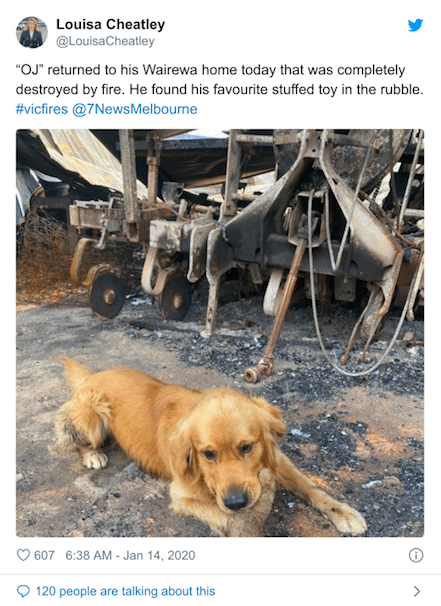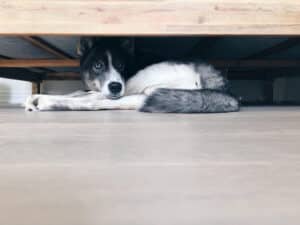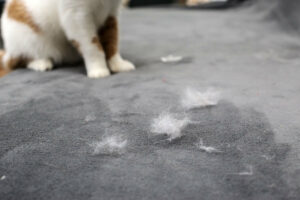Across the continent of Australia, thousands of homes have burned in the wildfires that have been ravaging the country since September.
The Zagame family were one of many families to feel the stinging heartbreak of their home being destroyed in the fires in Victoria.
7News reported on the burned-out property in Wairewa, which is in the state’s east. The news segment featured family members walking around, searching for items that might have survived. Unfortunately, not a whole lot was left.
But then, the smallest glimmer of hope surfaced as OJ, the family’s dog, discovered his most beloved toy.
Channel 7 reporter Louisa Cheatley uploaded a picture of the Golden Retriever happily pulling his stuffed toy from amongst the rubble.
The Zagame family is still in assessment of how much damage was made to their business, however, they’re expecting it to be in the millions of dollars.
The premier has announced a state-based inquiry into the Victorian bushfire disaster. https://t.co/5zYfOfohG3 @LouisaCheatley #7NEWS pic.twitter.com/OwQz6zKEX9
— 7NEWS Melbourne (@7NewsMelbourne) January 14, 2020
The federal government has already announced a lifeline that they will be extending to people just like the Zagames. The plan is to give farmers grants up to $75,000 in order to help them get back on their feet.
Prime Minister Scott Morrison has already said around $100 million has been allocated for these grants from the $2 billion bushfire recovery fund.
He added, “This is an estimate. It is not a cap. This will be a demand-driven program. [It] can be everything from sheds and fences, or it could be equipment, it could be the solar panels that actually power their pumping facilities on the dams or anything of this nature.”

Thousands of farmers are expected to be caught up in the bushfire crisis, with many losing everything in the wildfires. Agriculture Minister Bridget McKenzie has stated that it is going to take time to assess everyone’s claim and start helping people to rebuild their livelihoods.
“It is not just livestock losses. It is oyster sheds on the Clyde River. It’s what’s going to happen to those types of enterprises once the charcoal and ash, after a good rain, ends up in our waterways,” McKenzie said.
She added, “It is our Batlow apple farmers. It is our wine industry in the Adelaide Hills, our sheep and beef producers more broadly, and our dairy industry. The eligibility criteria will be incredibly simple because our goal is to get cash on the ground to the farmers so they can actually get on with the rebuilding. This is what we’ve been hearing is absolutely needed on the ground – cash payments to hire local contractors to get the job done so we can get back to producing food.”











